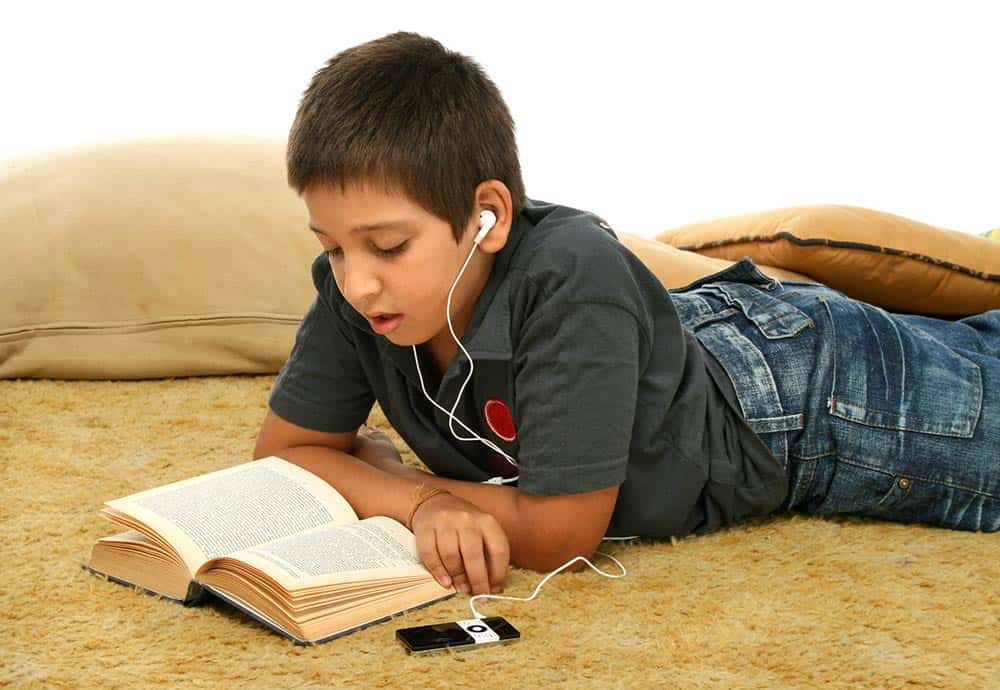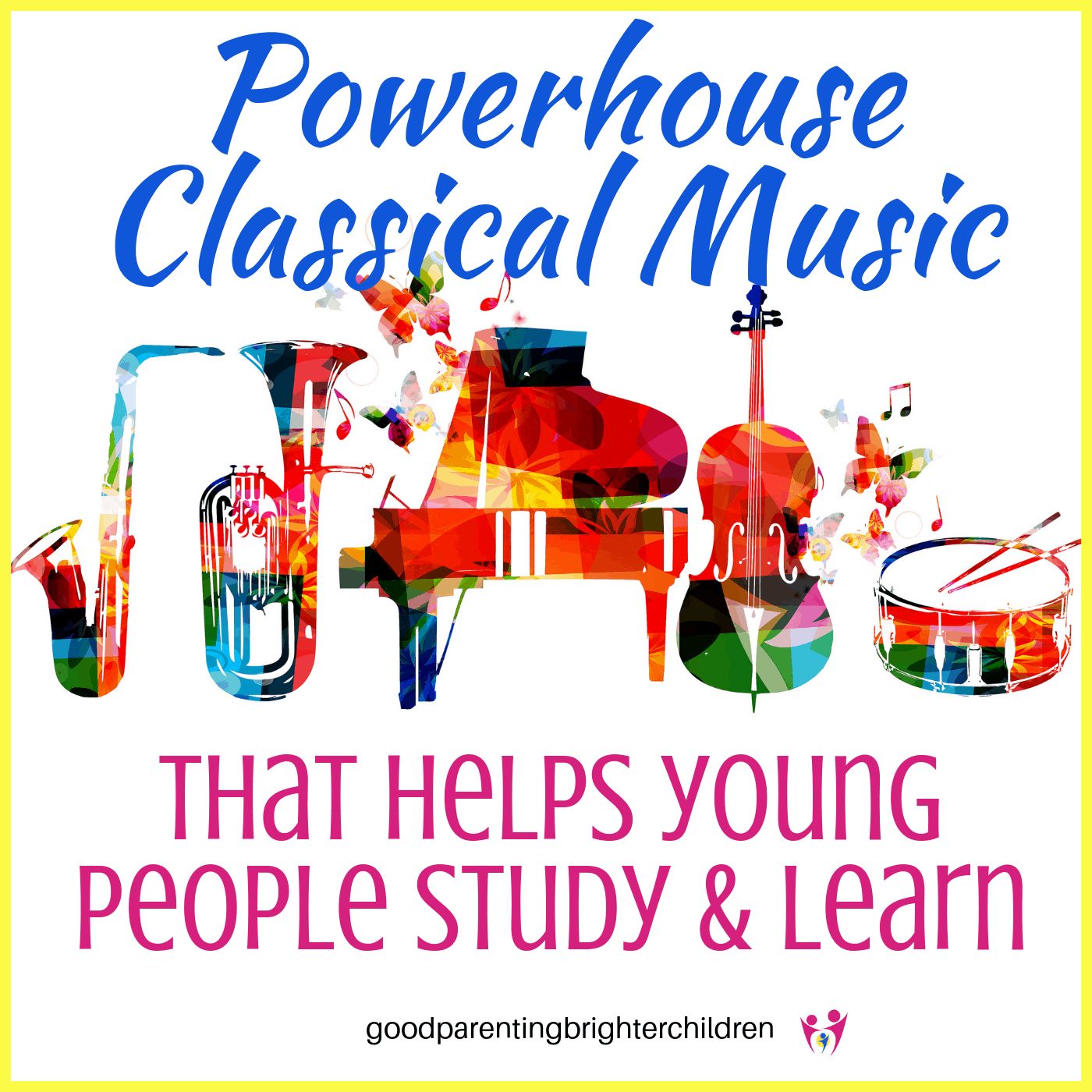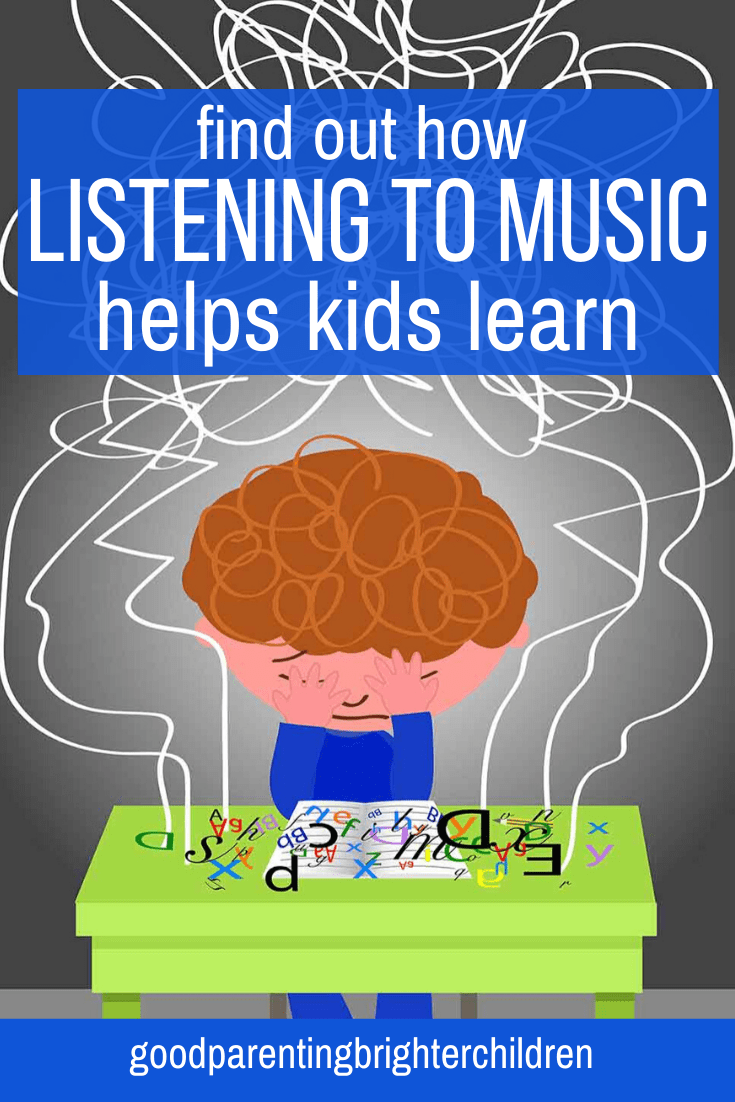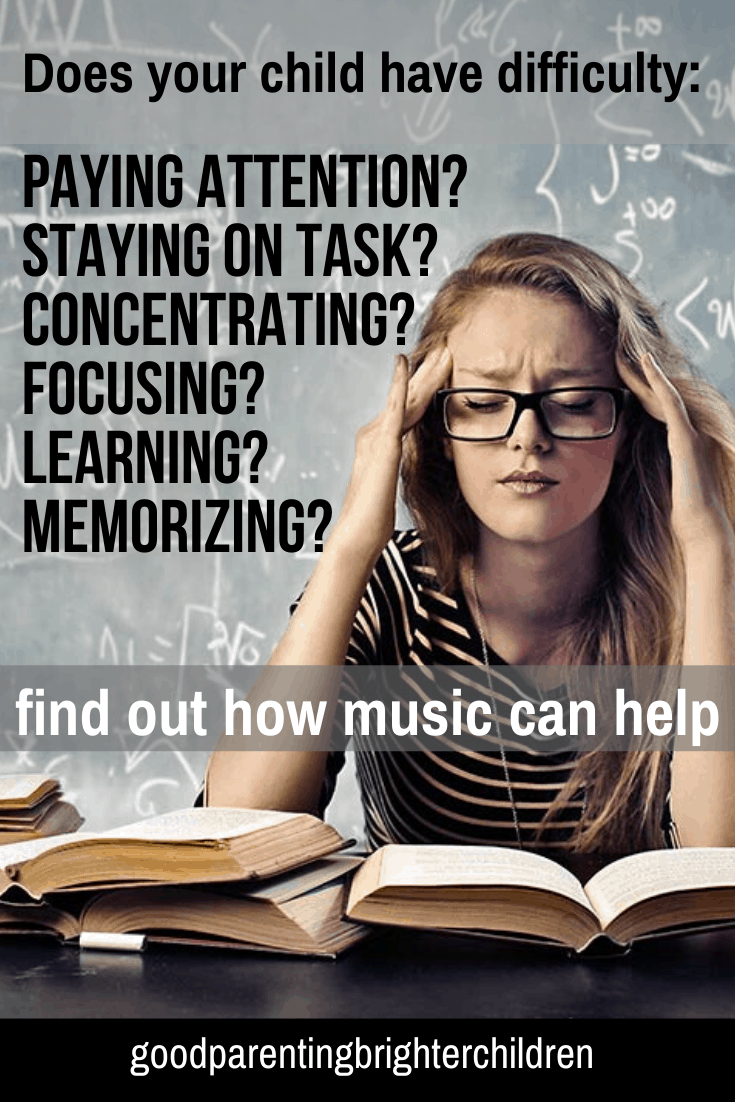Inside: Have you ever tried classical music for studying? It works! Try playing classical music in the background while your children and teens are studying—for increased concentration, focusing, memorization, and more!
Classical Music for Studying
The school year is underway. Homework, tests and all kinds of learning are in full swing. Preparing for college entrance exams (SAT, ACT) are on the minds of high schoolers everywhere.

It’s important that children have academic success. They are in school all day and need to feel that they can learn. One way to help them is with music–both learning a musical instrument AND listening to certain pieces of classical music while they are studying. It will help them focus, concentrate and memorize information easier.
So, the BIG question is: How are your children and teens really doing, so far as the learning process goes? Are they:
- Struggling academically, socially or emotionally?
- Having attention issues?
- Anxious and can’t learn?
- Overwhelmed and ready to give up?
- Problems concentrating and focusing on difficult and easy learning tasks?
- Experiencing regular meltdowns when doing homework or academic tasks?
- Have diagnosed learning problems that complicate learning?
- Don’t have learning issues but would like to have an edge when it comes to concentrating and focusing in class
Okay, get ready for a secret ingredient that will target these barriers and will help your children actually learn:
MUSIC
Yes, music in all its forms—learning a musical instrument and—LISTENING to specific pieces of classical music will help your child or teen learn!
Classical Music for Studying: It Works!
Let me recap the story of my son Brandon. He suffered a traumatic birth that left him with brain damage. He was diagnosed with every imaginable learning issue: auditory processing, visual motor, visual perception, ADHD, sensory integration issues, scotopic sensitivity syndrome, separation anxiety… It was overwhelming and discouraging.
We were told by the experts he would never graduate from high school and college was out of the question. To get the full scoop, check out the blog here.
Speaking from experience, I can tell you, experts are not always right. Brandon did graduate from high school and from college with a university GPA of 4.0. The secret behind his success?
MUSIC
First, he took music lessons. This exercised his entire brain at once. And second, when he did his homework or any kind of strenuous mental work, he listened to certain pieces of classical music.

Music can help severely learning disabled children to learn. If your child struggles from learning disabilities, have them listen to specific pieces of classical music. It will help them organize their brains; memorize information easier and help them to focus, concentrate, and even eliminate anxiety.
Learning a musical instrument was an amazing activity that helped him learn, but listening to music also helped—in different ways.
Listening to specific pieces of classical music changed the way his brain processed information. As a result, he was able to:
- memorize information much easier (absorb, retain and retrieve—important components of memory)
- focus and concentrate on his schoolwork without being distracted
- more organized in his thought processes
- less anxious
- increased sustained focused energy
Learning Increases When Children & Teens Listen to Classical Music
Brandon experienced what many scientists have found when children or teens listen to certain pieces of classical music with a specific beat and so can your child:
- Improved Listening Skills
- Better Concentration even with very challenging material
- Improved Focusing Skills after being relaxed through music
- Ease in Memorization (absorb, retain, retrieve)
- Easier to organize thoughts throughout the day
- Increase attention span
- Improved task concentration by alleviating anxiety through music and freeing the person to focus better
- Better speed and accuracy
- Quiet the mind and produce alpha brain waves for quiet focused thinking
Not only did Brandon benefit from listening to this music–so did his other 3 brothers (who didn’t have learning issues).
Classical Music for Studying: How Does Listening to Classical Music Affect the Brain?
So, how does listening to specific pieces of classical music affects the brain in all children and teens?

When your child listens to certain pieces of classical music while studying, the music changes the way the brain processes information; allowing your child to process and learn information easier and quicker.
Georgi Lozanov, a Bulgarian psychiatrist spent his career studying what happens to the brain when we listen to certain pieces of classical music set to a specific rhythm.
He found that when a child, teen or young adult listens to certain pieces of classical music, the electromagnetic frequency of the brain changes thus allowing the body to relax while the mind remains active.
When this happens, learning happens.
Memorization & Concentration Increased
Being able to concentrate and memorize information is important for children and listening to this music will help them memorize information quickly and easily.
Part of memory includes not only learning information but putting it into long-term memory and being able to retrieve the information when it’s needed.
It’s a 3-step process: Absorb, Retain and Retrieve.
- Absorb: information you are studying
- Retain: information by putting into long-term memory.
- Retrieve: information from long-term memory when needed.
Put yourself in your child’s shoes. He has studied long and hard for a test. He goes to take the test and his mind goes blank. Nerves aside, he can’t retrieve the information from the data banks of your memory. Test failed and confidence tanks!
Listening to classical music can change that!
When listening to this specific classical music the child/teen is able to not only process, learn and retain the information; they are able to bring it back from their memories when needed—like when taking a test or standing in front of their peers giving a book report or any task requiring the retrieval of information.

Memorizing information is a 3-step process. In order to be successful at memorization, it takes being able to absorb the information; retaining the information in long-term memory, and most importantly being able to retrieve the information learned. Listening to music will help the entire process.
Behavior and Emotions Improved
Some parents notice not only improved memory skills and learning abilities; they also notice an improvement in their child’s behavior. Today many children experience a gamut of emotional issues—sadness, anger, frustration, depression, feeling overwhelmed, anxious, etc. When this happens, learning stops. No one can learn when they feel miserable and their emotions take center stage.
Listening to this music can and does help with negative emotions by quieting the mind and producing alpha brain waves best for quiet, focused and stress-free thinking. The music causes the rhythms of the body—the heartbeat, brainwaves, etc.—to slow down and synchronize to the music. When the heartbeat slows, the mind works more effectively making it easier for a child or teen to learn more easily. Blood pressure and pulse are also lowered in this process. Psychologists for years have said if children and teens can relax, they can learn easier.
When evaluating if this music is working for your child or teen, don’t just look at academic improvements in memory, concentration, and aptitude; also look for improved behavior.
Ask yourself, “Is my child…”
- More relaxed and calmer?
- Seem more focused?
- Less agitated?
- Less argumentative?
- Able to complete tasks without my assistance or help?
When you are dealing with a child whose struggles are compounded with both academic and emotional challenges, and seeing first-hand how this music can change all that for the better –it’s a BIG deal!
Classical Music for Studying: Choosing the Music
Think about these questions:
What classical music is best for studying?
You’ll find lists everywhere. But it’s not just about getting a list of classical music; downloading it and playing it. Each piece of music is performed by many different artists and orchestras. You need the orchestra where the music has been recorded with a specific tempo and sound. That’s why taking my course with 78 classical music selections (each chosen for tempo and sound) is a good option.

When a child listens to specific pieces of classical music while studying; it changes the way the brain functions and they are able to concentrate better and learn information more efficiently.
Does classical music help with concentration?
Absolutely! As I’ve discussed earlier, listening to certain selections of classical music will change the way the brain processes information and increase concentration levels. With greater concentration, learning kicks into high gear.
Why is Mozart good for studying?
A lot of people erroneously think that ALL the music of Mozart will make you smarter. It’s not true. Mozart’s music is complex and was used with college students to increase spatial intelligence. However, it was only a temporary effect.
Lozanov found several pieces of Mozart’s music that were perfect to study with—one being Symphony no. 40 in G Minor. However, don’t just download it and start listening to it—you need the correct tempo and sound. And you need to understand how to prepare your child to listen to the music and the appropriate atmosphere to create for the best results.
A Complete Music Course & Guide
Not all classical music increases learning and memory.
Because of the complexity of classical music as opposed to other genres of music it definitely gives the brain a positive workout, but there are certain pieces that are very special in how they affect the brain. If you follow the step-by-step instructions on how to use it and are observant of what to expect, it can work for your child in many different ways.
That’s why I’ve created a course, “Powerhouse Classical Music that Helps Young People Study and Learn.”
It includes:
- 78 classical music tracks—all are specifically chosen for their sound and tempo and all have been studied by Georgi Lozanov for their ability to change the way your child learns and processes information.
- 2-hour video training
- 5 modules
- 8 lessons (that include step-by-step instructions)
- A downloadable PDF file of all the information from the lessons
- Classical Music List
- A copy of my 465-page eBook, Good Music Brighter Children and ways to read it to get the most benefit for your children.
- 11 videos on the power of music and learning
- Access to a private Facebook group (Good Music Brighter Children) to ask questions; pose concerns and get additional, personalized help.
- Option: A 30-minute personal coaching option with me is available!
The information in this course will put your child on a learning path that changes the way he/she learns and processes information and ultimately finds academic success. The course will be available February 25, 2020. Click here to access the course
Being able to learn is vitally important for a child. Children and teens are in school the majority of the day. They need to feel a measure of academic success.
Start with music—enroll your child in music lessons and play this classical music whenever they are studying. Helping your children/teens be a success in school means you are investing in their futures.
Want to remember this post? Post, “How to Use Classical Music for Studying With Amazing Results” to your favorite Pinterest board





Zach is a gifted young man and I’m so glad he further benefited with his studies from listening to the music!
Yes! Yes! Yes! Wait until your course becomes live…people will be knocking down your door for it. Or at least they should!! I can’t even begin to tell you how much adding this to Zach’s homework and studying routine has benefited him. Thank you again for inviting us to be a part of it all.